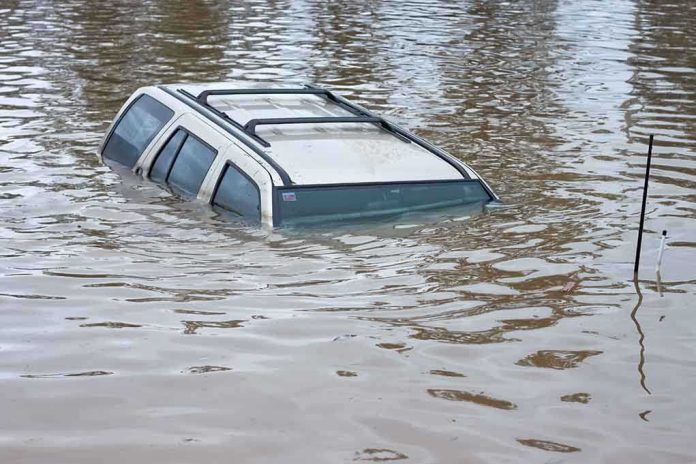
When disaster strikes, everyday Texans and private organizations step up to fill the void left by government bureaucracy, as seen yet again in the Houston Texans’ $500,000 pledge after the catastrophic Hill Country flood—a gesture that puts political virtue signaling to shame and leaves many wondering if the real American spirit now lives outside our government institutions.
At a Glance
- Houston Texans pledge $500,000 to support Hill Country communities devastated by a deadly flash flood.
- At least 50 people, including 15 children, are confirmed dead, with dozens still missing after the Guadalupe River disaster.
- Hundreds of campers and residents were rescued, but questions loom over emergency preparedness and government response.
- Flood exposes cracks in disaster readiness, while private and community aid outpaces bureaucratic action.
Private Generosity Fills the Void Left by Government Incompetence
Ask any average Texan what happens when government promises to keep you safe and then the skies open up. The answer is always the same: you’re on your own until the cavalry of common sense—neighbors, churches, businesses—rides in. The recent deadly flash flood that tore through Texas Hill Country, swallowing up parts of Kerr County and the scenic Guadalupe River, brought a horrifying reminder. In under an hour, water surged 25 feet, overwhelming local infrastructure and turning a quiet July 4 into a desperate scramble for survival. More than 750 children at Camp Mystic found themselves at the center of chaos, with over two dozen missing as rescue teams—underfunded, understaffed, but unbowed—rushed into action. While government agencies scrambled to coordinate, it was the Houston Texans football team—not a federal agency—who stepped up and announced a $500,000 donation to support recovery and relief. If you’re keeping score, that’s private enterprise: 1, government: 0.
When the smoke (or floodwaters) clears, it’s not a virtue-signaling “task force” or a committee that’s handing out blankets and comfort. It’s people with skin in the game—real money, real resources, real concern for their community. The Texans’ donation isn’t just a check; it’s a public rebuke of the bureaucratic tangle that lets tragedies escalate. Their statement—heartfelt and direct—underscored what most families and survivors feel: that support, prayers, and boots on the ground matter far more than another round of “thoughts and prayers” from politicians who disappear when the cameras turn off.
A Flood of Tragedy and a Torrent of Bureaucratic Red Tape
By the morning of July 6, grim numbers came in: over 50 dead, 43 of them from Kerr County alone, with 15 children among the victims. Hundreds had to be plucked from roofs, trees, and flooded cabins—sometimes by helicopter, sometimes by neighbors in boats. Over two dozen campers remain missing, with search and rescue operations stretching into their third day. The Red Cross provided shelter and tracked missing persons, while the Kerr County Sheriff’s Office—doing what it could—warned residents to stay off washed-out roads and away from the riverbanks. The scale of the disaster dwarfed anything the region had seen since the infamous 2015 Memorial Day floods, and—just as then—families found themselves waiting for answers, rescue, and relief.
But as the floodwaters recede, the real questions rise: Why, in a region known for flash flooding, were so many caught off guard? Why were hundreds of children at summer camps left exposed to the kind of disaster everyone knew was possible? And why does it take private organizations—like the Houston Texans—to get resources moving, while government agencies bog down in paperwork and press conferences? The death toll is likely to rise, and so will the calls for accountability—not from the bureaucrats, but from the families and communities who bear the cost of “good enough” disaster preparation.
A Call for Real Action—Not More Government “Compassion”
The aftermath of the Hill Country flood isn’t just about tragedy; it’s a referendum on priorities. If you needed another example of why Americans distrust big government, here it is, floating down the Guadalupe River. The response from state officials—Governor Abbott expanding the disaster declaration, the Red Cross scrambling to help, local authorities stretched to the breaking point—shows a system under strain and a leadership culture that’s reactive, not proactive. As the months drag on and rebuilding begins, the spotlight will turn to summer camps, local governments, and, yes, the politicians who love to claim they’re “fighting for Texas.”
But make no mistake: the real fight is being waged by the people and organizations who actually show up. The Houston Texans’ $500,000 pledge may not bring back lost lives or erase trauma, but it stands as a challenge to every bloated agency and self-congratulatory official. If billion-dollar sports franchises—and average citizens—can mobilize resources in hours, why does it take government days, weeks, or months? If protecting American families is the priority, then it’s time to stop pretending that “compassion” can be outsourced to bureaucracy. The future of Hill Country recovery will depend on hard work, accountability, and an unshakable belief in self-reliance—values that Washington, D.C., could stand to relearn.
Sources:
White House: Securing Our Borders



